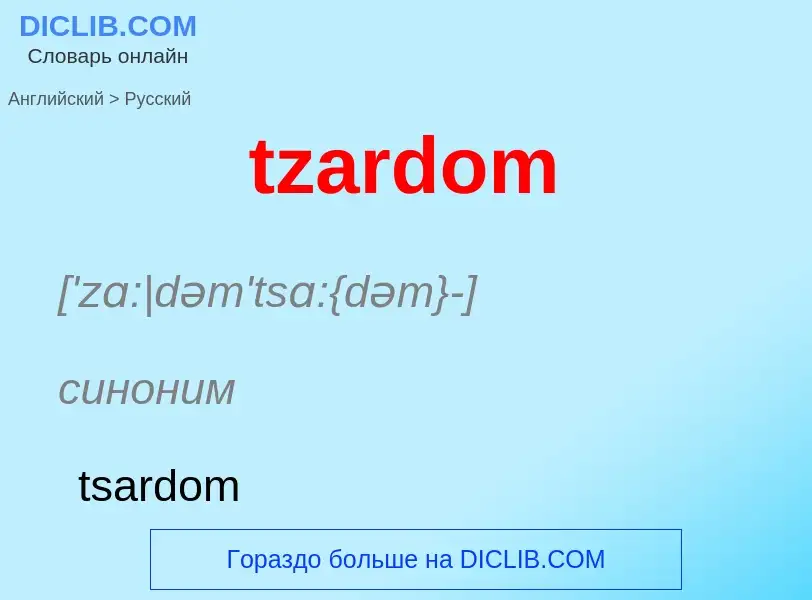Übersetzung und Analyse von Wörtern durch künstliche Intelligenz ChatGPT
Auf dieser Seite erhalten Sie eine detaillierte Analyse eines Wortes oder einer Phrase mithilfe der besten heute verfügbaren Technologie der künstlichen Intelligenz:
- wie das Wort verwendet wird
- Häufigkeit der Nutzung
- es wird häufiger in mündlicher oder schriftlicher Rede verwendet
- Wortübersetzungsoptionen
- Anwendungsbeispiele (mehrere Phrasen mit Übersetzung)
- Etymologie
tzardom - Übersetzung nach russisch
['zɑ:|dəm'tsɑ:{dəm}-]
синоним
Definition
Wikipedia

Tsar ( or ), also spelled czar, tzar, or csar, was a title used by East and South Slavic monarchs. The term is derived from the Latin word caesar, which was intended to mean "emperor" in the European medieval sense of the term—a ruler with the same rank as a Roman emperor, holding it by the approval of another emperor or a supreme ecclesiastical official (the Pope or the Ecumenical Patriarch)—but was usually considered by western Europeans to be equivalent to "king". It lends its name to a system of government, tsarist autocracy or tsarism.
"Tsar" and its variants were the official titles of the following states:
- Bulgarian Empire (First Bulgarian Empire in 681–1018, Second Bulgarian Empire in 1185–1396), and also used in Tsardom of Bulgaria, in 1908–1946
- Serbian Empire, in 1346–1371
- Tsardom of Russia, in 1547–1721 (replaced in 1721 by imperator in Russian Empire, but still remaining in use, also officially in relation to several regions until 1917)
The first ruler to adopt the title tsar was Simeon I of Bulgaria. Simeon II, the last tsar of Bulgaria, is the last person to hold this title.


![Reception of the tsar of Russia in the [[Moscow Kremlin]], by [[Ivan Makarov]] Reception of the tsar of Russia in the [[Moscow Kremlin]], by [[Ivan Makarov]]](https://commons.wikimedia.org/wiki/Special:FilePath/Emperor by Ivan Makarov.jpg?width=200)
![Crowning of [[Stefan Dušan]], [[Emperor of the Serbs]], as tsar, by [[Paja Jovanović]] Crowning of [[Stefan Dušan]], [[Emperor of the Serbs]], as tsar, by [[Paja Jovanović]]](https://commons.wikimedia.org/wiki/Special:FilePath/Paja Jovanović-Krunisanje Cara Dušana.jpg?width=200)
![Dušan]] of Serbia Dušan]] of Serbia](https://commons.wikimedia.org/wiki/Special:FilePath/Serbian Emperor Stefan Dušan, cropped.jpg?width=200)
![Emperor of Russia]]. Emperor of Russia]].](https://commons.wikimedia.org/wiki/Special:FilePath/Tsar Nicholas II -1898.jpg?width=200)
